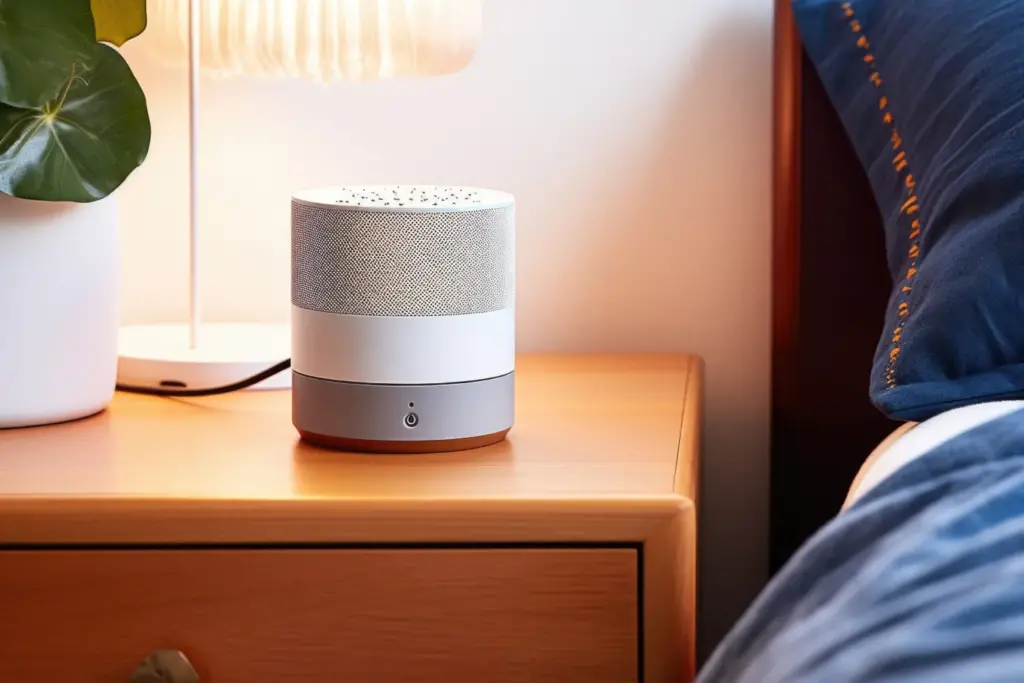Most people have heard that white noise can help people sleep, but did you know
researchers have identified other “colors” of sound that can be beneficial?
The spectrum of sound is vast, and each color has unique benefits — not just for
sleep but also in other areas of your life. Let’s explore the best sounds to ensure
a good night’s rest.
How Can Sound Support Sleep?
Even though we may not always be aware of it, we’re constantly taking in what’s
happening around us — it’s part of how our body subconsciously keeps us safe from
harm, and the sounds around you can also significantly impact your sleep quality.
Choosing supportive sleep sounds to surround you when falling asleep can help you
drift seamlessly off into dreamland. For example, ambient noise or the sound of
birds chirping might help put you at ease, making it easier to wind down and relax.
What Are the Best Sounds for Sleep?
There are many different “colors” of noise, including white, pink, brown, green,
blue, and brown. In addition, other forms of sound can also help support quality
sleep.
So, how can you tell what the best sounds for sleep are? We’ve highlighted a few of
the most popular types of noise, and how they may be able to help.
White Noise
White noise is easily the most well-known of the sound color spectrum. Like white
light, white noise is a combination of many frequencies. Each operates at the same
intensity, producing a sound similar to a whirring fan, a humming air conditioner,
or a static radio or television.
White noise is most helpful for masking environmental sounds, like traffic,
downstairs neighbors, or pets. However, white
noise can also help improve concentration.
That said, while there is plenty of research behind white noise, it’s not necessarily
the most beneficial of the available options in every case.
Brown Noise
Brown noise (sometimes called red noise) is a “deeper” sound than white noise, as the
lower frequencies have more intensity than the higher ones.
Instead of the higher-pitched static of white noise, brown noise is closer to the
sound of thunder or a powerful waterfall. Brown noise may provide a slightly calmer
sleeping environment for people who find white noise distracting.
Nature Sounds
Nature sounds, like the sound of the wind rustling through the trees or a gentle
rainstorm, have been relaxing people for ages — far longer than the technology to
mimic these sounds has been around.
Researchers have discovered that these sounds help bring peoples’ attention outward
into their environment, relaxing the nervous system and naturally reducing
stress and anxiety.
Relaxing Music
Although the idea of relaxing music is highly personalized and preferential, music in
general can also help soothe you to sleep. In fact, we tend to make use of this
theory from the moment we’re born — think about music boxes and baby mobiles on
cribs to help children fall asleep.
Music doesn’t have to sound a specific way to be relaxing, it just has to make you
feel at ease. If you use music instead of white or brown noise, keep the volume low
and opt for softer songs that won’t distract you.
ASMR
Thanks to social media, ASMR (short for autonomous sensory meridian
response) continues to increase in popularity — and it may have a wide range
of potential benefits.
ASMR is different from the other sounds we’ve discussed. The goal of ASMR isn’t
always to help you fall asleep, but instead to decrease stress and anxiety. ASMR
might give you a “tingling” feeling that travels down your spine, and if you find
the right sound, it can relax you enough to help you sleep more soundly.
How Else Can You Get High-Quality Sleep?
In addition to using sounds for sleep, there are other ways that you can work to get
longer, higher-quality nights of sleep. The quality of sleep you get involves
physical factors (like pre-existing health conditions and sleeping environment) and
psychological factors (like stress level and routine) — addressing sleep issues requires both of these
factors to be involved in order to make long-lasting changes.
Working with a coach knowledgeable in cognitive behavioral therapy for insomnia (CBT-I) can be a great place to start. These
professionals can help you look honestly at what is and isn’t working for you and
recommend ways to change your routine for the best quality sleep.
In addition, they’ll work alongside you to improve your sleep hygiene or the set of
habits surrounding your sleep. Sleep hygiene includes your bedroom temperature, how
supportive your mattress is, how dark you keep your room, when and how you exercise,
and what you choose to eat and drink during the day.
However, sleep hygiene can’t always “fix” issues on its own. The real key is looking
at the psychological factors impacting your sleep, which you shouldn’t have to do
alone. Overcoming sleep disturbances like insomnia can feel challenging, so
it’s best to reach out for help to understand the factors stopping you from getting
the best sleep possible.
The Bottom Line
While everyone has their own opinions on the best sounds for sleep, everyone is
unique, and it’s important to find the right one to get your best quality of sleep.
Work with a CBT-I coach to customize your
routine and address any issues stopping your rest from being as restorative and
supportive as you deserve. You can also take our free sleep quiz to
better understand your sleeping habits and how to address them.
Sources:
How Researchers Are Beginning to Gently Probe the
Science Behind ASMR | Smithsonian
Differential effects of white noise in cognitive and
perceptual tasks | PMC
It’s true: The sound of nature helps us relax |
ScienceDaily
Noise as a
sleep aid: A systematic review | PubMed






